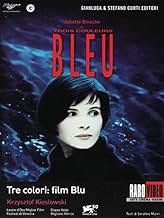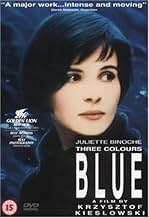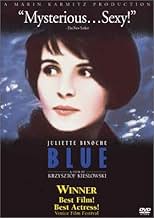Una mujer lucha por encontrar una forma de vivir su vida tras la muerte de su marido y su hija.Una mujer lucha por encontrar una forma de vivir su vida tras la muerte de su marido y su hija.Una mujer lucha por encontrar una forma de vivir su vida tras la muerte de su marido y su hija.
- Dirección
- Guión
- Reparto principal
- Premios
- 22 premios y 19 nominaciones en total
Benoît Régent
- Olivier
- (as Benoit Regent)
Charlotte Véry
- Lucille
- (as Charlotte Very)
Hélène Vincent
- La journaliste
- (as Helene Vincent)
Yann Trégouët
- Antoine
- (as Yann Tregouet)
Reseñas destacadas
Often times when viewing an intelligent film like this I have to really contemplate what the implications the film maker making mean to me. This film was no exception. Kieslowski, with his background in non-fiction film making, is applying the french political value of liberty to a personal situation. He is, in essence, studying the human condition through fiction. The meaning of "liberty" takes on a very different meaning for Julie in this film. She tries to gain liberty from her memories and her emotions only to find that it is an impossible task. This is not a film to casually throw on after supper. This film requires a commitment by the audience to really consider Kieslowski's implications, for he is telling us (throughout this trilogy) what he thinks makes a "good" person. The score is beautiful and has a character of its own in the plot. A must see for true film lovers but perhaps a little too much for someone expecting a casual encounter.
BLEU (TROIS COLEURS) / France/Poland 1993 (4 STARS) 23 January 2004: The thing that stands out most about Blue is the expression (or lack there of) of grief. How does a woman, seemingly fulfilled by happiness, react when that happiness is yanked away in one telling moment, in a car accident in which both her husband and her daughter pass away? That is the central understudy - a strong woman's attempts at finding purpose in the seeming absence of meaning. Mise-en-scene: I watched an interview with Juliette Binoche, where she mentions that Kieslowski refused to make the film unless it had her in it. It's easy to see why. I can't imagine Bleu without Juliette its not just that she lends her personality to the film
Bleu IS Binoche.
I was thrown off by the sub-plots of the character's relationships with her mother and the striptease dancer, as I was about the seeming resolution at the end of the film. There were perhaps references that I missed but the almost happy' ending left me feeling un-relinquished. Given that I had shared such an intense journey with Julie, it seemed almost improper to accept that she would settle in to a normal relationship again.
Cinematography: The 1st shot of the film - that of a car tire racing - shot from the bottom of the moving car establishes this as not your typical movie'. The sequence-of-shots that follow eerily draw one into the compelling story-telling style of Krzysztof Kieslowski, minimalist in its approach, with a world communicated without dialogue in the first five minutes of the film. Blue is not your typical art-house film. Its production values are up there with the best, and the cinematography by Slavomir Idziak (who's craft was recognized by Hollywood in Black Hawk Down), is nothing short of stunning. The lighting is low key and soft, and wraps around the characters to create a mood of subtlety. A distinguishing feature is the detail in the shadows. None of the close-ups fully illuminate the protagonist, almost hinting at her vulnerability at facing the light, though the delicate use of eye-lights does well to bring alive her emotions. The camera, an intelligently used narrative element, interacts with Julie and partakes in her emotions, respecting them and yet accentuating their intensity as she plods on in an alien world of deep personal purposelessness. The tight close-ups penetrate her soul and force us to delve into Julie's mind and share in her agony. Editing: deftly uses match on action to create irony while forwarding the narrative. Sound: The pace is hauntingly slow and silence has been used compellingly. It screams with meaning as it is becomes one of the more important elements as the narrative progresses. Bleu is not a film you can watch, consume and move on. Either you'll feel that you've totally wasted your time and will probably not be able to sit through (the pivotal occurrence is over within the first five minutes of the film without a single world being spoken, and the rest of the film is essentially the protagonist's psychologically subjective journey) or you'll realize by the time you've reached the end that you'll revisit this film at various points in time, explore and read about it, discuss it with people you respect, and try to get closer to the essence of Kieslowski. For there are two now well-accepted truths about the folklore surrounding Kieslowski, whose reputation continues to mount posthumously 1. that Kieslowski carefully interwove elements that were rich with meaning and social irony, and 2. that figuring those elements out and appreciating their implications is probably a lifelong learning process.
I was thrown off by the sub-plots of the character's relationships with her mother and the striptease dancer, as I was about the seeming resolution at the end of the film. There were perhaps references that I missed but the almost happy' ending left me feeling un-relinquished. Given that I had shared such an intense journey with Julie, it seemed almost improper to accept that she would settle in to a normal relationship again.
Cinematography: The 1st shot of the film - that of a car tire racing - shot from the bottom of the moving car establishes this as not your typical movie'. The sequence-of-shots that follow eerily draw one into the compelling story-telling style of Krzysztof Kieslowski, minimalist in its approach, with a world communicated without dialogue in the first five minutes of the film. Blue is not your typical art-house film. Its production values are up there with the best, and the cinematography by Slavomir Idziak (who's craft was recognized by Hollywood in Black Hawk Down), is nothing short of stunning. The lighting is low key and soft, and wraps around the characters to create a mood of subtlety. A distinguishing feature is the detail in the shadows. None of the close-ups fully illuminate the protagonist, almost hinting at her vulnerability at facing the light, though the delicate use of eye-lights does well to bring alive her emotions. The camera, an intelligently used narrative element, interacts with Julie and partakes in her emotions, respecting them and yet accentuating their intensity as she plods on in an alien world of deep personal purposelessness. The tight close-ups penetrate her soul and force us to delve into Julie's mind and share in her agony. Editing: deftly uses match on action to create irony while forwarding the narrative. Sound: The pace is hauntingly slow and silence has been used compellingly. It screams with meaning as it is becomes one of the more important elements as the narrative progresses. Bleu is not a film you can watch, consume and move on. Either you'll feel that you've totally wasted your time and will probably not be able to sit through (the pivotal occurrence is over within the first five minutes of the film without a single world being spoken, and the rest of the film is essentially the protagonist's psychologically subjective journey) or you'll realize by the time you've reached the end that you'll revisit this film at various points in time, explore and read about it, discuss it with people you respect, and try to get closer to the essence of Kieslowski. For there are two now well-accepted truths about the folklore surrounding Kieslowski, whose reputation continues to mount posthumously 1. that Kieslowski carefully interwove elements that were rich with meaning and social irony, and 2. that figuring those elements out and appreciating their implications is probably a lifelong learning process.
An accident results in loss and pain, the rejection of a world that you refrain, you seek withdrawal, isolation, segregation, separation, and transition to a life, where you abstain. But seclusion still has links and ties and cords, that retract and pull and cannot be ignored, reconnection through a box, reveals a secret that's unlocked, that begins to reconnect, and to restore.
It's a wonderful performance from Juliette Binoche as she elegantly weaves Kieslowski's tale of freedom into a contemporary setting. Packed full of symbolism that requires numerous visits to absorb, you may find a myriad of interpretations of your own too.
It's a wonderful performance from Juliette Binoche as she elegantly weaves Kieslowski's tale of freedom into a contemporary setting. Packed full of symbolism that requires numerous visits to absorb, you may find a myriad of interpretations of your own too.
Blue is one of those little movies that grows on you. The more you think about it the more you like it. That's not to say that it's not enjoyable to view; the cinematography and music are marvelous. But this is Juliette Binoche's movie. Everything revolves around her character, Julie, who, in the first scene, survives an automobile accident that claims the lives of her famous composer husband and her five-year-old daughter. Now alone the remainder of the movie delves into Julie's long emotional recovery. Not traumatic, or depressing as the subject matter may imply it is instead subtle, graceful, and beautiful.
TROIS COLOURES: BLEU is a rich, dark film with all the Kieslowski marks: death, silence, depression, and the inner torment of outwardly attractive women. After seeing the whole trilogy and the DEKALOG, I'm convinced at Kieslowski's great talent, and his very early death was a true blow to world cinema. Much like Kubrick but with a less ironic nature, Kieslowski loves to make his characters and stories both humanely distant, realistic, and, at the same time, philosophically idealist and dense. I enjoyed BLEU more than BLANC (which was an odd machismic entry in a trilogy mainly focusing on women) but not as much as ROUGE, which I feel is one of the finest, most beautiful, most well-done films I've ever seen.
More specifically, BLEU's focus seems to be on the relationship of a woman's loss of the tactile manifestation of her husband's existance with the ligering notions of his life - especially his music, which pervades the entire film, interrupting at key moments with a blackout and short blast of the overture. To watch Julie struggle with her husband's abandoned secrets (including a mistress Julie befriends) is shattering, frustrating, and perplexing.
Unfortunately, life must move, and, due to that, I can't watch BLEU over and over. However, I did glean from one viewing the complexity of this picture, and recognize its need to be watched over and over, until Kieslowski's last gasps can be properly understood, which is all we can hope to return to a man whose genius was tragically cut short, but still stands as a giant in my view of cinema.
More specifically, BLEU's focus seems to be on the relationship of a woman's loss of the tactile manifestation of her husband's existance with the ligering notions of his life - especially his music, which pervades the entire film, interrupting at key moments with a blackout and short blast of the overture. To watch Julie struggle with her husband's abandoned secrets (including a mistress Julie befriends) is shattering, frustrating, and perplexing.
Unfortunately, life must move, and, due to that, I can't watch BLEU over and over. However, I did glean from one viewing the complexity of this picture, and recognize its need to be watched over and over, until Kieslowski's last gasps can be properly understood, which is all we can hope to return to a man whose genius was tragically cut short, but still stands as a giant in my view of cinema.
¿Sabías que...?
- CuriosidadesAt the 2018 Visegrad Film Forum, cinematographer Slawomir Idziak claimed that the script and initial cut of this film focused on the journalist character (played by Hélène Vincent) and her efforts to investigate the authorship of the unfinished musical composition that drives the plot. It was only during the editing process that director Krzysztof Kieslowski re-structured the film to focus on Julie (played by Juliette Binoche).
- PifiasWhen Oliver tells Julie he will not incorporate her changes into the musical score, a boom mic is visible briefly as Julie puts down the phone.
- Citas
Julie Vignon: Now I have just one thing left to do: nothing. I want no possessions, no memories, no friends, no lovers -- they're all traps.
- Créditos adicionalesThe final credit says in French, "We thank Alfa Romeo who allowed the scene of the accident to the Alfa 164 whose dynamics are of course purely imaginary."
- ConexionesFeatured in The 51st Annual Golden Globe Awards (1994)
Selecciones populares
Inicia sesión para calificar y añadir a tu lista para recibir recomendaciones personalizadas
- How long is Three Colors: Blue?Con tecnología de Alexa
Detalles
- Fecha de lanzamiento
- Países de origen
- Sitio oficial
- Idiomas
- Títulos en diferentes países
- Tres colors: Blau
- Localizaciones del rodaje
- Palais de Justice, Paris 1, París, Francia(hall of justice)
- Empresas productoras
- Ver más compañías en los créditos en IMDbPro
Taquilla
- Recaudación en Estados Unidos y Canadá
- 1.324.974 US$
- Fin de semana de estreno en EE. UU. y Canadá
- 6413 US$
- 5 dic 1993
- Recaudación en todo el mundo
- 1.554.108 US$
- Duración
- 1h 38min(98 min)
- Color
- Mezcla de sonido
- Relación de aspecto
- 1.85 : 1
Contribuir a esta página
Sugerir un cambio o añadir el contenido que falta

![Ver Bande-annonce [OV]](https://m.media-amazon.com/images/M/MV5BZGFhMTA5ODQtM2Q4OC00NTI0LTkyYjgtMGViODA0YWZjZmI3XkEyXkFqcGdeQXRyYW5zY29kZS13b3JrZmxvdw@@._V1_QL75_UX500_CR0)
![Three Colors: Blue: The Criterion Collection [Blu-ray]](https://m.media-amazon.com/images/M/MV5BZThmZGMzY2EtZTdiNy00NjMwLTk1YTQtOTVlNGIxYjRhZGYzXkEyXkFqcGdeQXVyNzU1NzE3NTg@._V1_QL75_UX500_CR0)































